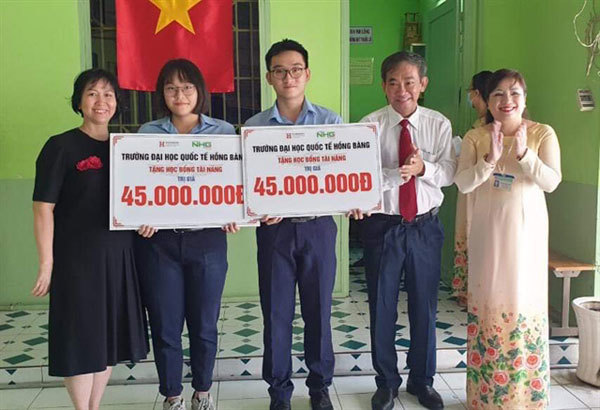 |
| Hong Bang International University presents scholarships to students. Photo Courtesy of the university |
Hong Bang International University in HCM City, for instance, is co-operating with Sacombank to provide preferential loans for its students.
The loan term for four years of study is 10 years. Parents and students can apply for the loan at any Sacombank branch in the country.
Students can also use the bank’s credit card to pay tuition fees at Hong Bang International University. They can pay in installments at the interest of zero per cent within a 24 month period.
Dr Ho Thanh Phong, rector of Hong Bang International University, said: “The assistance programme is expected to help students in financial difficulties, especially those caused by the COVID-19 pandemic.”
“We expect Vietnam’s young generation to have chances to study and improve their knowledge and skills, and access international learning environment because they are the country’s future intellectuals contributing to development,” Phong added.
He said the university is also providing many full scholarships worth a total of VND20 billion (US$861,824) this year.
New students with high scores on the Scholastic Assessment Test (SAT) or who have won prizes in national and international contests are eligible to receive these scholarships.
The university’s new students in the 2020-2021 academic year will receive a 20 per cent reduction of the first semester’s tuition fees if they confirm their intention to attend the school at an early date.
Students selected to study in the university’s preschool education faculty will receive a scholarship worth hundreds of millions of dong for their four-year course if they pledge to work at international kindergartens of the Nguyen Hoang Group within five years after graduating.
The university is a member of the Nguyen Hoang Group.
Van Hien University in the city will provide VND30 billion ($1.3million) scholarships for its new students from the Hung Hau Heart Fund. New students will receive a 40 per cent discount on tuition for the first semester.
If they face financial difficulties, they can pay VND3 million in advance and start their studies at the university.
The university this year offers tuition of VND99 million for a four-year course in its all faculties. It pledges not to increase tuition during the four-year course.
University students who face financial difficulties can borrow money at the interest rate of zero per cent to pay tuition fees.
The university will also provide money for meals and accommodation for its new students in the first academic year.
Nguyen Dang Quang, deputy head of the division for student affairs at International University - Vietnam National University Ho Chi Minh City, said: “The university has sought many different sources of scholarships to provide its students.”
“It has taken efforts to take care of the physical and mental life for students. It also provides services relating to accommodation, health insurance, security and safety,” Quang said.
It is co-operating with the Dormitory Management Centre to prepare enough accommodations for its students, Quang said.
In the 2020-2021 academic year, demand for accommodations is nearly 1,600, including 500 spaces for new students.
The university also has homestays with more than 100 accommodations in the city centre for students who prefer to live there.
HCM City Open University said it would provide scholarships for new students at a total VND9 billion. It will continue to provide scholarships for students with financial difficulties who have good or outstanding results, and those who win prizes in contests.
The Government has provided loans for students since 2007. The current loan is VND2.5 million per month for each student. Poor students receive an allowance of VND100,00-140,000 per month.
According to the Ministry of Education and Training, the country has 236 universities with 1.7 million students. Of these, 171 universities are public.
Deputy Minister of Education and Training Nguyen Van Phuc said the expenditures allocated for the education sector are low, only around 0.5 per cent of gross domestic product.
Tuition fees
In the 2020-2021 academic year, the tuition fees of public universities that have not been granted autonomy will increase, unlike previous years.
These universities will have a ceiling on tuition fees of majors in social sciences, economics, laws, agriculture-agro-fisheries at VND9.8 million per year; VND11.7 million per year for majors of natural sciences, techniques, technologies, sports, arts, hotels, and tourism; and VND14.3 million per year for majors in medicine and pharmacy.
These fees increased by VND900,000 to VND1.3 million compared to the previous academic year.
At public universities that have been granted autonomy, the ceiling on tuition fees are VND20.5 million per year for majors in social sciences, economics, laws, and agriculture-agro-fisheries; VND24 million per year for majors in natural sciences, techniques, technologies, sports, arts, hotels, and tourism; and VND50.5 million per year for majors in medicine and pharmacy. These fees have increased by VND2 million to VND4.5 million compared to last year.
The country has 23 universities that have been granted autonomy in training, international co-operation, and finance.
Many universities have had to invest in their facilities and reform their training programmes toward higher quality, which has led to tuition increases. VNS
Gia Loc

Universities urged to develop plans to adapt to another COVID-19 outbreak
Universities in Vietnam should start preparing different scenarios to adapt if the country experiences new COVID-19 incidences in the community, said Dr Nguyen Ngoc Dien, rector of Hoa Sen University.

VN universities provide scholarships to ease burden on disadvantaged students
Many universities in HCM City plan to provide scholarships to students whose families’ livelihoods have been affected by the COVID-19 pandemic or who live in the Mekong Delta and are affected by drought and saltwater intrusion.